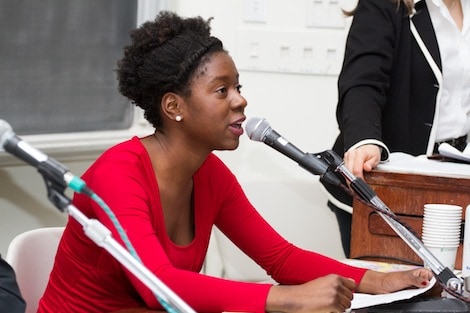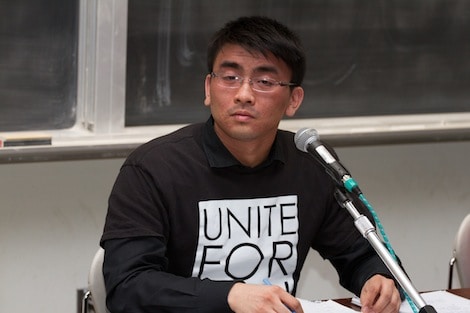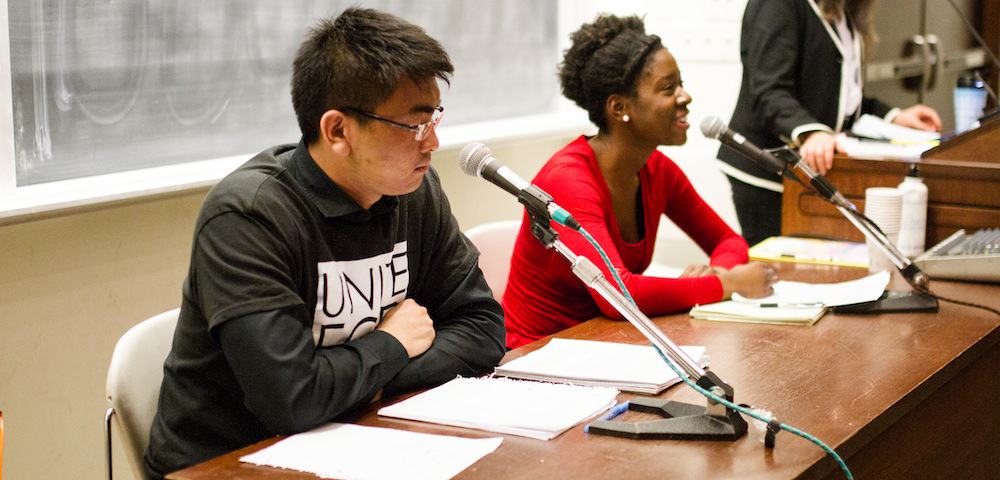“To ensure student voices are heard”

SHIIJE ZHOU/THE VARSITY
Yolen Bollo-Kamara, candidate for U of T Voice, was the UTSU’s vice-president, equity this past year. She expresses pride in her accomplishments in that office, particularly her work surrounding mental health. “One of the activities we did that was really simple was this activity around just asking students how happy they were at the moment,” said Bollo-Kamara. “We ended up having tons of volunteers just going around campus with these giants signs that said ‘How happy you are” on a scale of 1 to 10?’ Students would fill it out and it really initiated a conversation about our well-being as students.”
This project was the beginning of her effort to fulfil her promise of instituting a “Mental Health Week,” which would have been a campaign to raise awareness about mental health issues. She didn’t quite do that, but she did collaborate with a number of mental health advocacy groups on campus to hold a five-dollar lunch at Hart House called “What’s on your mind?” “We were able to do outreach with all these different groups,” said Bollo-Kamara. “And so students had the opportunity to learn what each of those groups did, but also be able to engage in a conversation about what mental health means for them.”
She wishes to continue her efforts with mental health on campus next year by pushing for a fall Reading Week. “I think that students want a break because, you know, breaks are nice, but it’s for sure important to realize that being a student can be really stressful, and especially first-year students, but really all students, have difficulty sometimes adjusting to the university experience, and it’s important to have time at which they can evaluate how the year is going, and get support if they need it, and, I really want to stress, before the end of term exams in the fall,” she says.
She explains that she plans to accomplish this goal by lobbying the university administration. Indeed, advocacy seems to be the lynchpin of her platform, as she returns repeatedly to the idea of pressuring those with power, like U of T’s administration and the provincial and federal governments, in order to effect positive policy changes for students. “A few of our platform points kind of revolve around the issue of government funding for post-secondary education, as well as international students,” said Bollo-Kamara. “One of the things that we recognize is that we have the lowest government funding for post-secondary educatidon in the province of Ontario, which contributes to the fact that we have the highest tuition fees and we graduate with the highest amount of student debt.”
The negative effects of U of T’s relatively paltry per-student funding are sometimes less obvious than tuition fees or student debt, however. Bollo-Kamara recounts how she has attended meetings at which members of the U of T administration express the need to attract more international students in order to subsidize the tuition of domestic students, a strategy that ties in handily with the university’s recent decision to raise international tuition by 9 per cent every year for the next five years.
Before this year, U of T also used flat fees in order to make up for the lack of funding, a policy that all students taking at least three full-course equivalents (FCEs) during a semester would have to pay tuition for five. This resulted in a substantial loss for numerous students who took between three and five FCEs. “I think that this year we had a huge victory with flat fees. We worked really hard; we collected thousands of petitions, and we got the government to finally increase the threshold at which flat fees are charged to students across Ontario,” said Bollo-Kamara. “We want to further push to eliminate flat fees altogether, because I still think that students should not be charged for more courses than they’re taking.”
Bollo-Kamara acknowledged that victory on both these issues, dramatic increases in international student fees, and flat fees for all students, rely on increases in funding for post-secondary education by the government. Though she promises to continue the union’s work lobbying the government for those increases, there remains substantial work to be done. Bollo-Kamara could not remember the last time the union successfully secured an increase in per-student funding for post-secondary education. It has not increased since 1991. All the union’s goals rely on success at this final hurdle. After all, the school must get money from somewhere.
“We want to continue that work, to build community, to support students’ voices, to ensure students’ voices are heard, and so I’m really excited to be working with this team,” concluded Bollo-Kamara, expressing the hope that she could be elected so that she could continue the work she has been doing. —Theodore Yan
“Student union is built on democracy”

SHIIJE ZHOU/THE VARSITY
Asked why he wanted to run for president of the UTSU, Ye Huang responded in the form of a story. “Last year in May, or June, I was finding school resources for my friends, because they were having a hard time,” he began, in the manner of someone telling a much practiced anecdote. “A lot of my friends are Chinese international students, they are not so much involved.” Huang then did his own research into the union, looking for resources his friends could take advantage of. What he ended up finding was unexpected, and troubling.
“I came across the Trinity report to the UTSU, and the Victoria report, and I learned all these things about defederation and the possible dissolving of the UTSU.” Huang explained how he saw the UTSU as a great resource for students, and something that could continue to be so, if only someone was willing to change it’s structure internally. He says that he wants students to take advantage of what is provided for them by the fees that they pay.
Huang’s leadership experience comes from in his involvement with various Chinese student associations, and his founding and current leadership of the Alpha Kappa Si, a fraternity focused on academics. Yet, he does not describe himself as someone naturally drawn to leadership. “I’m not the kind of person that’s seeking, you know, a top position, from the beginning. I’m more of a moderate person.” He went on to explain that even though he does not necessarily seek out executive positions, that he has come to realize that sometimes stepping into the role of the leader is necessary in order to ensure real change.
Describing how he assembled his team, Huang had one definitive answer: talking to people. “Nobody knows who I am — seriously. Before this, generally, nobody. I mean like, publicly speaking. I knew some of my team members before hand, but other than that I wasn’t known. It was more about the communication I had with the people I wanted to work with — about showing them I want to do what my goal is, and can you fit into that, do you want to pursue that same goal?”
When asked if he was worried about his lack of a public profile in comparison to the incumbent team, which features two current UTSU executives, Huang’s response was decidedly nonchalant. “I mean, experience is one thing, but we do think only having the experience will not guarantee someone to do a great job,” he said, smiling slightly, as if embarrassed to present any criticism of the other slate, of which he has been unfailing complementary of thus far.
The conversation moved towards platform points and goals, and Huang immediately raised the issue of defederation. “As presidential candidate, I care the most, or well, one of the things I care the most about is that I don’t want the UTSU to dissolve. I know a lot of college students, a lot of college councils are thinking about leaving the UTSU, this is one of the biggest reasons I lead this campaign with my team, it’s also our common goal,” explained Huang. “We hope that if we get elected people gain trust in the UTSU. Have you know, college councils, college council leaders back on the table, to talk about how we can improve the UTSU.”
The next inevitable question was what his response would be if student groups continued to stand firm and insisted on leaving the union. Huang paused for the first time in almost twenty minutes, and looked down, examining his hands. When he did respond, his answer was halting, but firm. “If I’m running an organization and it’s defederating I shouldn’t love this to happen. I should hate this to happen. I should hate it very much. But, the student union is built upon democracy and students will, so if that extreme case really happened, I, personally, I should respect that decision. I think that this is my job, it’s also the requirement of this job.”
Huang supports the expansion of the non-credit course policy — currently students can take up to two full year courses and receive only a pass/fail credit on their transcript. “We think that the school should raise that limit because first of all students can pursue their own interests in courses the more easily, without considering too much about affecting their own grades,” explained Huang.
Finally turning to the issue of transparency, Haung was reluctant to levy any real criticism against the current executive. Instead he simply said “I think that right now they’re fine, they’re doing good. They can do better — especially on the financial side.” He explained that if elected his team would provide the actuals on financial reports and budgeting. He proposes working closely with college unions, club leaders and other student groups to create a more accessible and better understood budget. “In this way we avoid duplicating events, duplicating services, we don’t waste energy or money.”
Throughout the interview Huang is composed and courteous, but with an underlying sense of urgency to get his ideas across, and to make sure he is understood. His main focus is overwhelmingly that what his team’s name suggests: unity. “I still believe people should try their best to change things internally, instead of breaking things down.” — Sarah Neidoba


